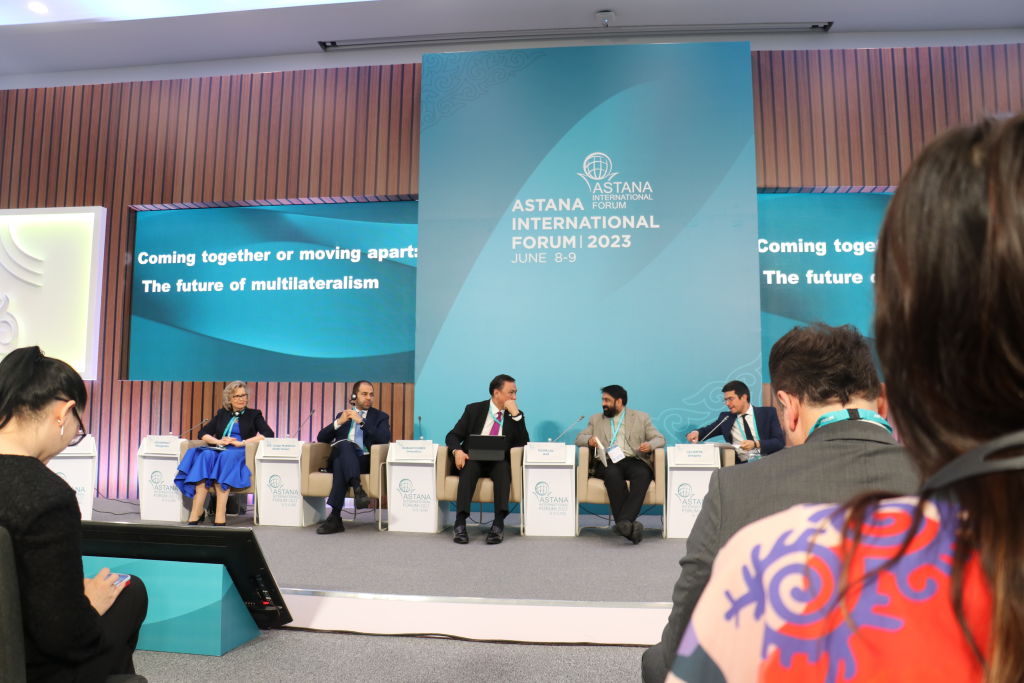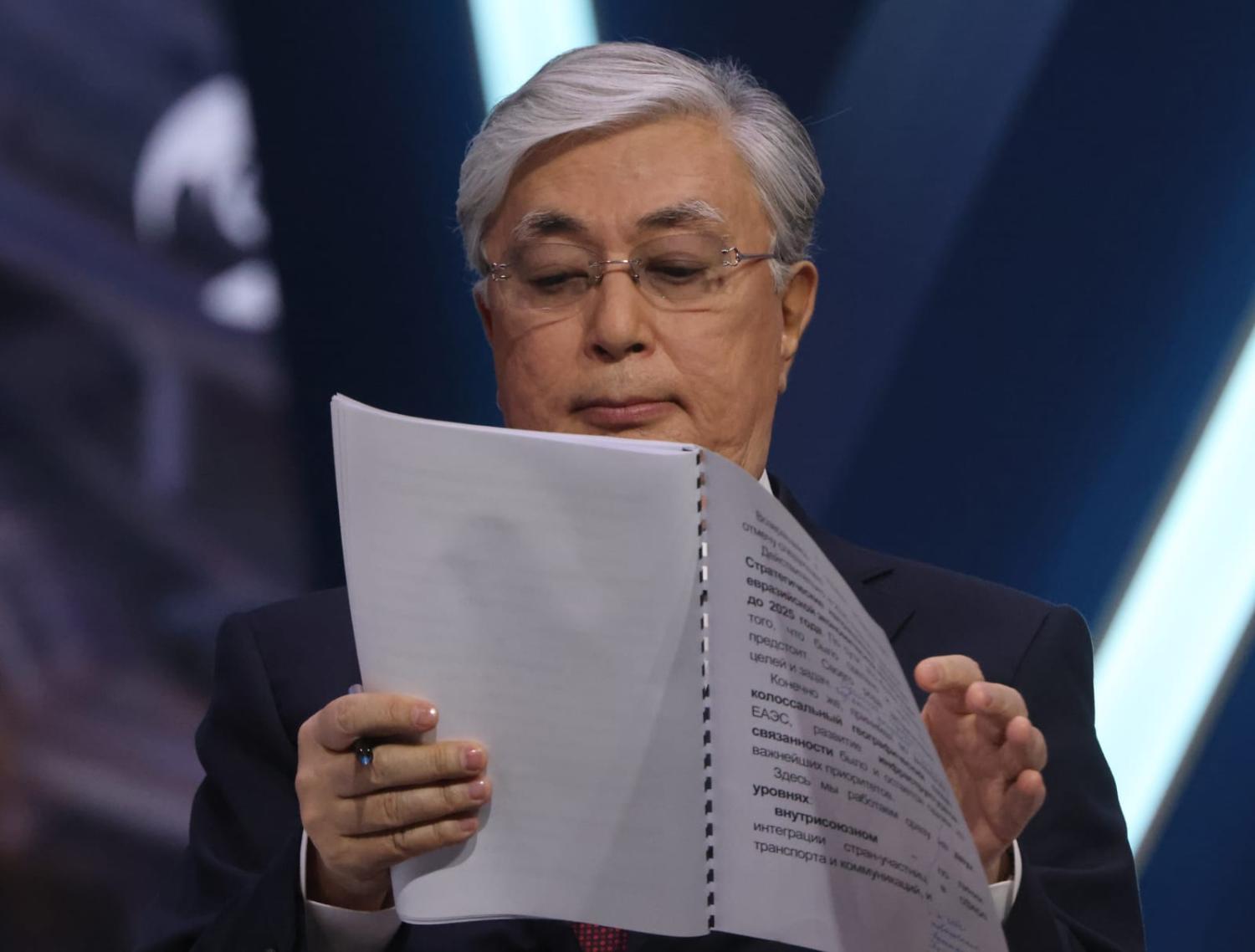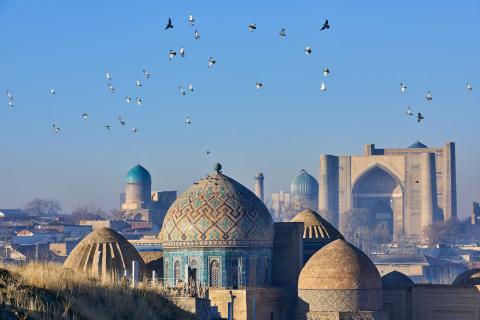Kazakhstan, Russia’s nominal ally in the Collective Security Treaty Organisation (CSTO), seeks to strengthen economic and political ties not only with the West, but also with various international institutions. That, however, does not mean that Astana aims to completely turn its back on the Kremlin, although there are indications that, in the coming months and years, the Central Asian nation may attempt to distance itself from Moscow.
Prior to the full-scale Russian invasion of Ukraine in February 2022, the Kremlin treated Kazakhstan as a relatively reliable partner. Sometimes the two nations found themselves at odds. When Russian President Vladimir Putin said in September 2014 that “Kazakhs never had any statehood” and that their “desire for closer ties with Russia is profound”, then-Kazakhstan President Nursultan Nazarbayev threatened to leave the Russian-dominated Eurasian Economic Union. Yet to this day, the Central Asian state remains part of the Russian-led bloc, although Astana’s relations with Moscow seem to have deteriorated.
The Kremlin’s war in Ukraine has allowed Kazakhstan to actively implement its decades-old multi-vector foreign policy – based on peacefulness, balance and pragmatism – established by Nazarbayev. Kazakhstan has not joined the anti-Russian sanctions imposed by the West on Moscow. But neither has it assisted the Kremlin, repeatedly stating that Astana will not allow Russia to use Kazakh territory to evade sanctions.
“We do not support anti-Russian sanctions, but we comply”, Kazakhstan’s Minister of National Economy Alibek Kuantyrov told me in an interview, emphasising that the risk to Kazakh companies from secondary sanctions related to their strong trade and logistic ties with Russia remains high.
According to some reports, advanced microchips – used in everything from missiles to de-mining robots – are flowing into Russia from Kazakhstan. That is one of the reasons why the United States warned that companies and banks in Kazakhstan could face secondary sanctions if found to be aiding Russia to circumvent sanctions. In order to avoid such an outcome, the Central Asian nation has recently introduced an electronic monitoring system for goods exported to the Russian-dominated Eurasian Economic Union (EAEU). In other words, even though the EAEU is a free trade bloc that includes Armenia, Belarus, Kazakhstan, Kyrgyzstan and Russia, Astana – aiming to avoid secondary Western sanctions – is taking measures that may violate one of the very basic principles of the Eurasian Union – the free movement of goods.
“Our economic interests are our top priority”, Kuantyrov stressed, pointing out that Kazakhstan’s integration into the EAEU will “not go beyond economy”.

Astana does not seem to support any form of political integration into the Russian-dominated entity. But given that Kazakhstan’s northern neighbour is Kazakhstan’s major import partner, and that the country remains highly dependent on Moscow for its energy exports, for the time being the former Soviet republic will undoubtedly seek to preserve strong economic ties with Russia. At the same time, Astana will likely attempt to develop close economic cooperation with neighbouring Central Asian states – Kyrgyzstan and Uzbekistan.
Since the leaders of the two countries – Kyrgyz President Sadyr Japarov and Uzbek Prime Minister Abdulla Aripov – were major guests at the Astana International Forum (AIF) held in the Kazakh capital on 8–9 June, it is entirely possible that Kazakhstan aims to strengthen ties with its neighbours, be it in a form of bilateral cooperation or through the Organisation of Turkic States. Coincidentally or otherwise, no Russian representative attended the AIF. Could that mean one of the Central Asian nation’s top foreign policy priorities, besides increasing regional economic ties, will be to strengthen connections with major global actors, namely with the West?
The fact that officials from the European Union, rather than Russia, discussed in Astana a wide range of issues, from global conflicts to artificial intelligence and digitalisation, suggests that Kazakhstan attempts to gravitate towards the West, at least to a certain extent. In February, the leader of the Kazakh Aq Jol Democratic Party, which is part of the pro-government People’s Coalition, said that the question of the Central Asian country’s accession to the EU is planned to be raised “sometime in the future“. Given Kazakhstan’s geography, such a narrative does not look realistic, although Astana will undoubtedly seek to increase its economic cooperation with the EU.
On 20 May, Brussels and Astana signed the €9 million (AU$14.4 million) EU–Kazakhstan Cooperation Facility Financing Agreement on the implementation of various economic projects in the former Soviet republic. And, according to Kazakhstan’s Deputy Foreign Minister Roman Vassilenko, in 2022 Astana’s trade with the EU reached a record high of US$40 billion. Moreover, Kazakhstan is the third-largest oil supplier to Germany. The problem for Astana, however, is that 80 per cent of Kazakhstan’s oil exports to Europe go through Russian pipelines. Since Russia has a history of stopping the transit of Kazakh oil to the European Union, the Central Asian nation is actively pushing for diversification of its energy exports.
But such shifts are part of a long-term process. In the meantime, Astana will likely have to continue balancing its nominal alliance with Moscow with its ambitions to establish closer economic ties with the West. And in the era of unprecedented geopolitical tensions, that could be easier said than done.

